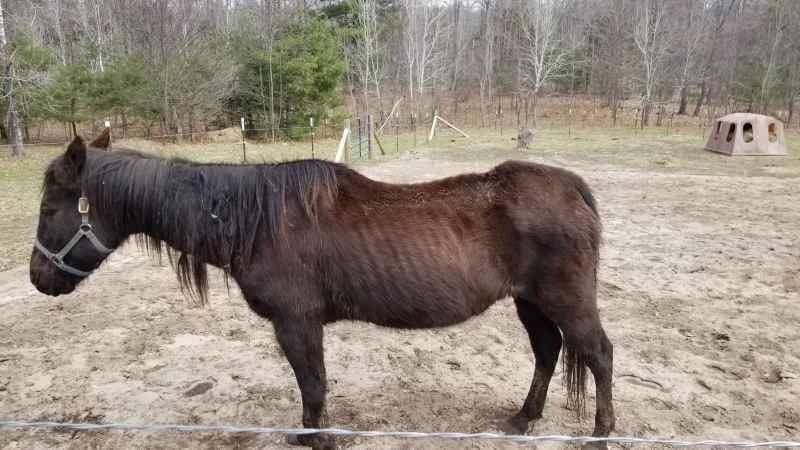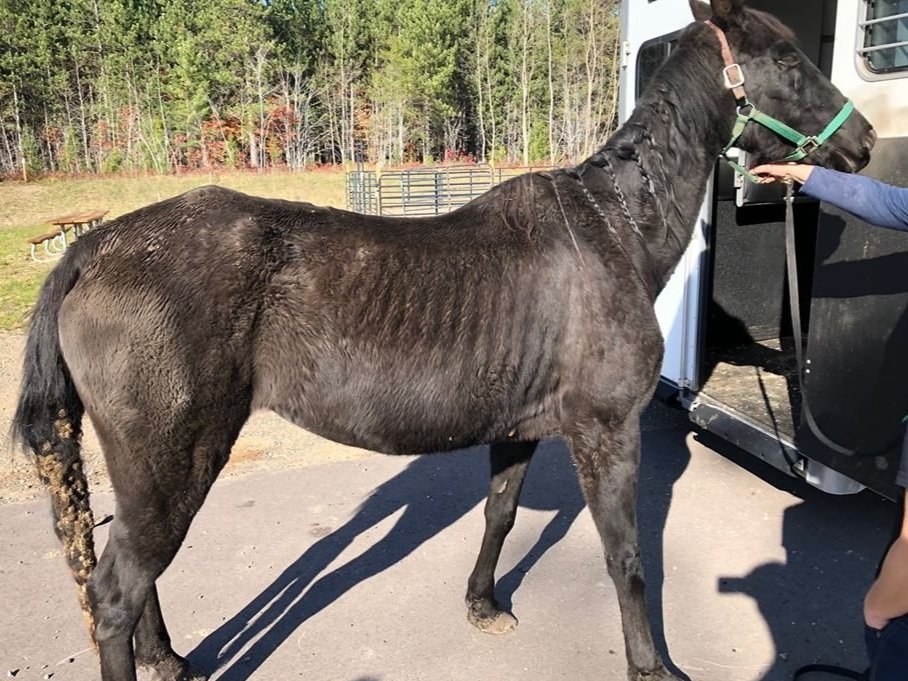How to help a horse in need
As we head into the winter months, Michigan and other northern states tend to see emaciation cases in horses amp up. Horses burn forage to keep warm, so a lack of proper food and shelter can lead a horse to lose weight incredibly fast. Spotting an emaciated horse standing in a blizzard with no feed can be heartbreaking. If you find yourself in that kind of situation, here is some information that might be of assistance to you in taking steps to get that horse help!
Step One: Make Absolutely Sure that the Horse is in Trouble
For anyone who isn’t familiar with horses, here are a couple of things to keep in mind before proceeding:
Healthy horses are hardy. They grow thick winter coats and have excellent self-insulation. A healthy horse of a good weight with a thick winter fur coat and access to hay and shelter can be perfectly fine without a blanket all winter long.
If snow is piling up on the horse’s back, that means the horse’s natural insulation is working. Think of a house roof - if it has good insulation the snow won’t melt because the heat is trapped inside as desired.
A horse at an ideal weight might show some faint rib outlines, especially if they are turning. A hint of rib is not necessarily concerning. However, a horse’s ribs should definitely not all be clearly visible.
All that being said, a horse without access to food and shelter and/or one not healthy enough to grow a winter coat and not provided with a blanket, will drop weight disturbingly quickly in our cold winters. Horses burn forage to stay warm and, without it, they quickly use up their reserves. Without feed available, the situation can become life threatening for the horse very quickly.
Clear visibility of all ribs, protruding bones, particularly the hips, a sunken appearance particularly along either side of the horse’s spine, and an accompanying dull and/or thin coat, unable to fluff up and insulate the horse as necessary, are all signs that a horse might be in trouble.
For a frame of reference, horse owners and professionals judge a horse’s weight on a scale of 1-9, with a five being an ideal score, though a horse in heavy training who is very lean might appear more like a score of 4 and still be healthy. If a horse is at a body score condition of 3 or below, not being fed enough to improve, and/or consistently not wearing a blanket (not just has it off to air out on a nicer, sunny day), then there is a problem with the standard of care.
Step Two: If it is possible and SAFE, make Contact with the Horse’s Owners
***If for any reason you are concerned that speaking to the horse’s owner may compromise your safety, skip immediately to step three and contact the proper authorities, do not risk making contact***
Sometimes truly good owners fall on hard times, and although they should have reached out for help before allowing the horse’s condition to drastically decline, some don’t know where to look, especially if they are elderly, and perhaps they will be eager for some guidance and options. Remember if an owner is elderly, they may not be competent with pursuing online resources, so be ready with printed materials and phone numbers if you truly think they only need a little help to turn the situation around.
If they need hay, connect them with the Michigan Horse Welfare Coalition Hay Bank. Owners dealing with a temporary setback can apply for assistance providing they have a plan to get back on their feet. https://michiganhorsewelfare.org/hay-bank/
If you can see they are trying to feed the horse a proper diet but are struggling to get weight on their horse, connect them to individuals or rescues who have experience in feeding thin horses, provide them with reputable articles on the topic, or help them make an appointment with a good veterinarian. Follow up to be sure they are implementing strategies.
A horse being old is not an excuse for a horse being drastically underweight!
If they seem overwhelmed and unwilling or unable to do what is necessary for the welfare of the horse, kindly suggest that they contact a rescue and consider relinquishing their horse so that he can receive the proper care.
However, if the owners are unavailable, belligerent, callous, uninterested, or take no immediate steps to improve the welfare of their horse, it may be necessary to take legal action to save the life of the horse.
Once again - DO NOT attempt to speak to the owners first if you have any concerns whatsoever about your safety. Call Animal Control. You can provide the same resources to AC to help them in their communication with the owner.
Step Three: Contact Your County Animal Control
It is important to understand that although rescues will always desperately want to help, there is nothing a rescue can legally do unless the animal is relinquished by the owners or is seized by law enforcement. A rescue removing an animal from a property without authorization is guilty of theft.
It is also not the most effective strategy to ask a rescue to contact authorities for you. If you have placed eyes on the animal in trouble, your voice is by far the most valuable. If you have friends who have also witnessed the neglect, ask them to call as well. Multiple people voicing concern will help indicate the urgency of the situation.
The best way to involve a rescue from the beginning is to open communication with them regarding the potential for housing. Contact your nearest rescues and ask them if they have space available and could take on the horse if Animal Control manages to take possession of the horse or the owner indicates that they are willing to relinquish. AC often does not have a good ability to house a horse, and so they can shy away from pursuing a relinquishment or seizure. If you can offer them the names of the closest rescues and tell them one or more has space if needed, it might make it easier for the officer to open a case.
Michigan counties have their own Animal Control units. Some are better than others. However, it is important to keep in mind that even the best Animal Control officers who truly want to help are hampered by Michigan’s toothless welfare laws when it comes to horses. Following the proper procedure can make it easier for them to take action if possible.
Call the Animal Control of the country where the horse resides. You can easily find their number online. You will need to provide the exact address where the horse is located, and request that they perform a welfare check on the animal. Be sure to specifically use the words “welfare check.” Leave your name and contact details and ask them to call you and give you an update on what they found. Keeping calling if necessary until they have performed the check.
This is the hardest part. DO NOT provide any feed or water to the horse before animal control has done their welfare check. If there is feed and water on the property, it will be assumed to have been provided by the owner. Once again, even a good animal control officer who understands the situation and wants to help, is going to struggle to be able to make a case under Michigan law if there is food and water on site.
When speaking to animal control:
Be persistent, call back if needed, but remain polite.
Keep your tone friendly and appreciative, thank them for looking out for the animals – people are always more willing to help you if you are kind.
Be clear and factual. Give details regarding the horse’s level of emaciation in terms of ribs showing, sunken backbone, etc., and indicate the lack of visible food and water on site. Animal Control officers have to deal with a lot of calls that amount to nothing at all, make sure to give enough information and details so that they realize there is legitimate concern.
Offer them as much support as you can. If you have spoken to rescues that could take on the horse, be sure to tell the AC officer that. If you can help arrange transport of the horse if needed, or know that the rescue you have contacted is able to handle trailering, be sure to let them know. If the rescue can be available to help catch the horse or you have connections to other experienced horse handlers, be sure to offer. Not all animal control officers are necessarily experienced with equines. All of these are resources that the AC officer will have to have lined up before serving a warrant to seize a horse, and anything you can offer to provide might make it that much more likely to be done and speed the process.
It is all of our responsibility to speak up for animals without a voice, and although we want to avoid flooding Animal Control officers with unwarranted reports, when in doubt, it is always better to ask than to ignore.
On behalf of all of us at Horse North Rescue, thank you for your desire to help horses in need!






